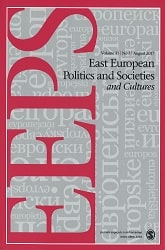The Invention of the “Cursed Soldiers” and Its Opponents: Post-war Partisan Struggle in Contemporary Poland
The Invention of the “Cursed Soldiers” and Its Opponents: Post-war Partisan Struggle in Contemporary Poland
Author(s): Kornelia KończalSubject(s): Military history, Political history, Post-War period (1950 - 1989), History of Communism, Fascism, Nazism and WW II, Politics of History/Memory
Published by: SAGE Publications Ltd
Keywords: “cursed soldiers”; post-war partisans; memory activism; invented tradition; politics of memory; anti-communism; agency; Poland;
Summary/Abstract: This article explores one of the most dramatic shifts in the mnemonic landscape of contemporary Poland: the invention of the “cursed soldiers” (żołnierze wyklęci). Coined in the early 1990s, this term is nowadays not only a well-established and popularly accepted description of Polish partisans fighting against the Soviet and communist authorities around 1945, and the symbol of various forms of their commemoration. It is also a powerful tool of political mobilization, subject to an intellectual debate about historical facts and moral values, as well as an object of commodification. As shown in this article, the invention of the “cursed soldiers” consisted of three stages: their legacy was claimed by popular opinion from the late 1980s, gradually acknowledged by the state around 2011, and eventually taken over by one political force after 2015. By exploring the agency operating behind the transfer of the “cursed soldiers” from the margins of memory activism to the center of the state-sponsored politics of memory, this article argues for a comprehensive study of the social and political mechanisms of memory-making in modern Poland and beyond.
Journal: East European Politics and Societies
- Issue Year: 34/2020
- Issue No: 01
- Page Range: 67-95
- Page Count: 29
- Language: English
- Content File-PDF

